Orthodox Epiphany 2025: Date, History, & Traditions
Orthodox Epiphany 2025 falls on January 19th, commemorating Jesus Christ’s baptism in the Jordan River. This major Orthodox Christian feast, also known as Theophany, celebrates the revelation of the Holy Trinity and marks the end of the Christmas season.
Orthodox Epiphany: A Celebration of Divine Revelation
Orthodox Epiphany, also called Theophany, is one of the most significant feasts in the Eastern Orthodox Church. Unlike Western Christianity, which celebrates the visit of the Magi on January 6th, Orthodox Christians focus on the baptism of Jesus Christ in the Jordan River. This event is seen as a crucial moment of divine revelation, where the Holy Trinity was manifested to the world.
The Date of Orthodox Epiphany 2025
In 2025, Orthodox Epiphany will be celebrated on January 19th. This date follows the Julian calendar, which is used by many Eastern Orthodox churches. It’s important to note that while the Greek Orthodox Church celebrates Epiphany on January 6th, most other Orthodox churches observe it on January 19th.
The Significance of Theophany
Theophany, meaning “manifestation of God” in Greek, commemorates the baptism of Jesus by John the Baptist in the Jordan River. This event is considered a theophany because it revealed the Holy Trinity to the world.
This revelation of the Trinity is a central aspect of Orthodox theology and is celebrated with great reverence during the Epiphany feast.
Traditions and Customs of Orthodox Epiphany
Orthodox Epiphany is rich in traditions and customs that vary across different countries and cultures. These practices often revolve around the theme of water, symbolizing purification and renewal.
The Great Blessing of Waters
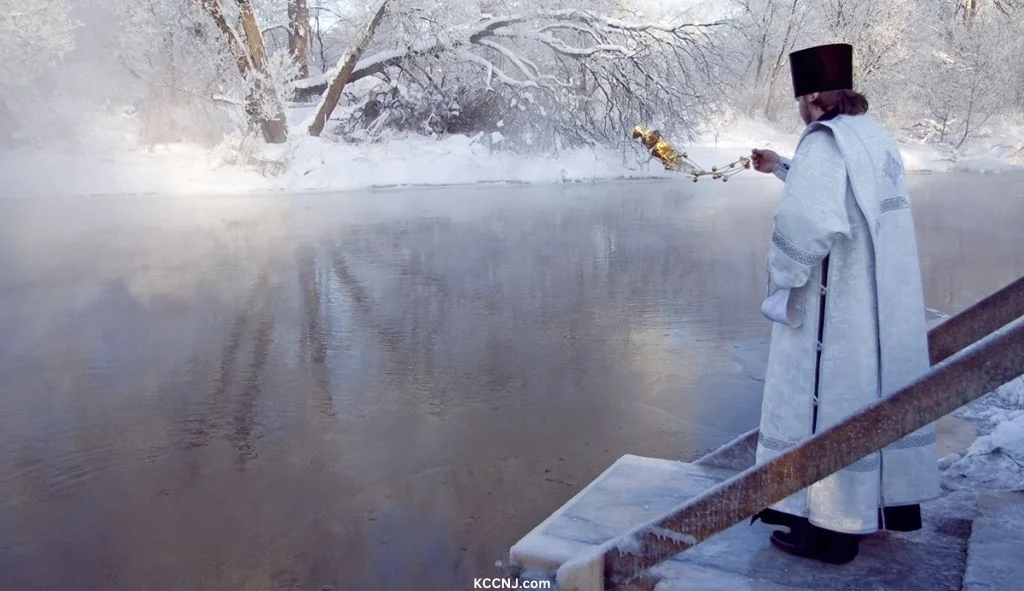
One of the most important rituals of Orthodox Epiphany is the Great Blessing of Waters. This ceremony typically takes place twice:
- On the eve of Epiphany (January 18th)
- On the day of Epiphany (January 19th)
During this blessing, a priest or bishop blesses a body of water, whether it’s a sea, river, lake, or even a container of water in the church. The blessed water, known as “holy water,” is then distributed to the faithful to use throughout the year for blessing homes, drinking, or anointing.
Ice Swimming and Water Immersion
In many Orthodox countries, particularly in Eastern Europe and Russia, there’s a tradition of ice swimming or immersion in cold water on Epiphany. This practice is known as “Epiphany bathing” and is believed to wash away sins and bring good health.
In Russia, this tradition has gained significant popularity in recent years. In 2018, an estimated 1.8 million people participated in over 7,300 ice swimming events across the country. Participants cut cross-shaped holes in frozen bodies of water and plunge into the icy waters, often three times to honor the Holy Trinity.
House Blessings
Another common tradition during the Epiphany season is the blessing of homes. Priests visit parishioners’ homes, sprinkling them with holy water and offering prayers for protection and prosperity in the coming year.
Epiphany Processions
Many Orthodox communities organize processions on Epiphany day. These often involve carrying a cross to a nearby body of water, where the blessing of waters takes place. In some places, young men dive into the water to retrieve a cross thrown by a priest, with the belief that the one who retrieves it will have good fortune in the coming year.
Orthodox Epiphany Around the World
While the core meaning of Orthodox Epiphany remains the same, its celebration varies across different countries and cultures.
Russia
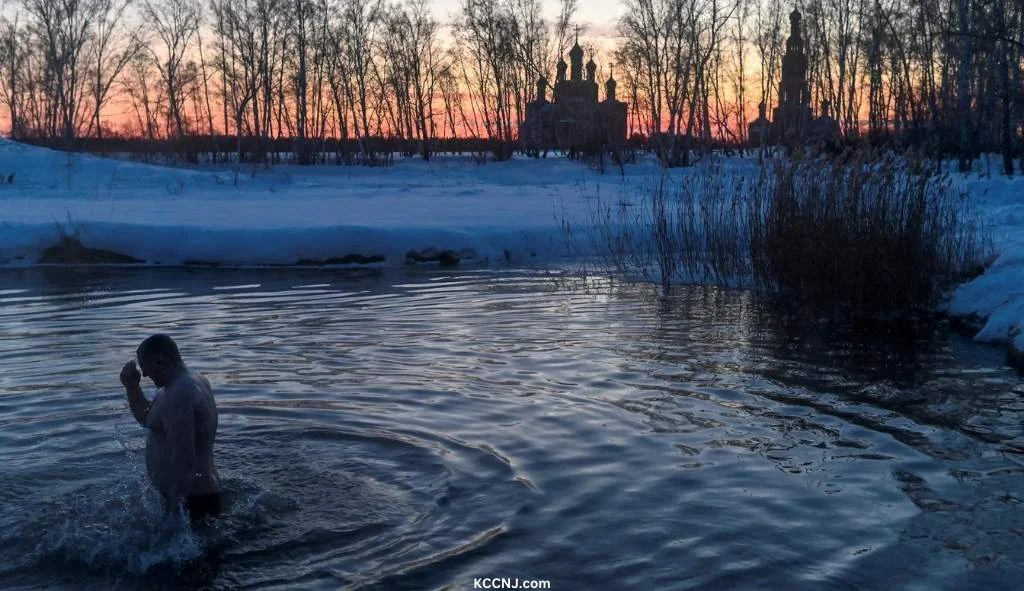
In Russia, Epiphany is a major religious and cultural event. The ice swimming tradition, known as “Kreshchenskoe kupanie” (Epiphany bathing), is particularly popular. Despite the extreme cold, millions of Russians participate in this ritual each year.
Russian Orthodox churches also hold special services on Epiphany Eve and Epiphany day. The night service on January 18th is particularly solemn and beautiful, often lasting several hours.
Greece
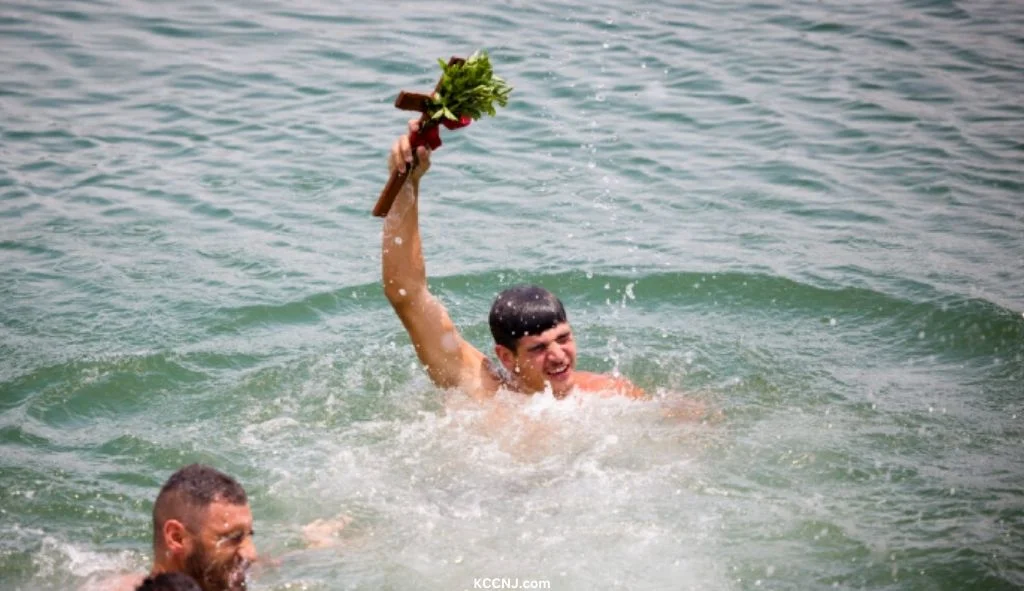
In Greece, Epiphany is known as “Theofania” or “Fota” (Lights). One of the most distinctive Greek traditions is the blessing of the waters and the “retrieval of the cross.” In coastal towns and islands, young men dive into the sea to retrieve a cross thrown by a priest. The person who retrieves the cross is said to have good luck for the year.
Another Greek custom is the “Kalanta,” where children go from house to house singing Epiphany carols and receiving sweets or small gifts in return.
Bulgaria
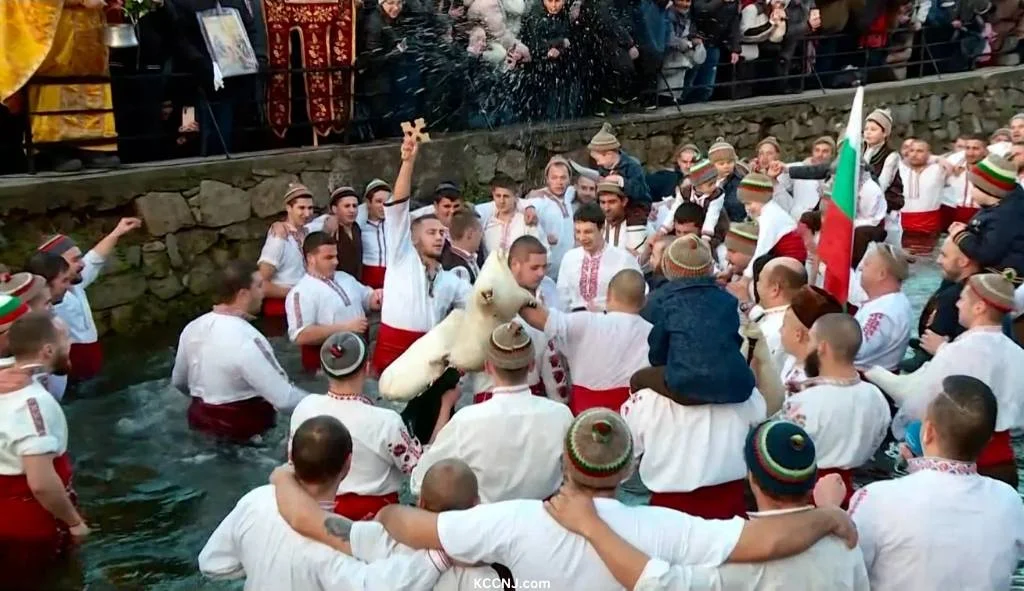
In Bulgaria, Epiphany is called “Yordanovden” (Day of Jordan), named after the Jordan River where Jesus was baptized. Like in Greece, there’s a tradition of throwing a cross into rivers or the sea, with men competing to retrieve it.
Bulgarian folklore also associates Epiphany with the end of the midwives’ feast, which begins on January 6th. On this day, young women who have given birth in the past year visit their midwives with gifts to express gratitude.
Romania
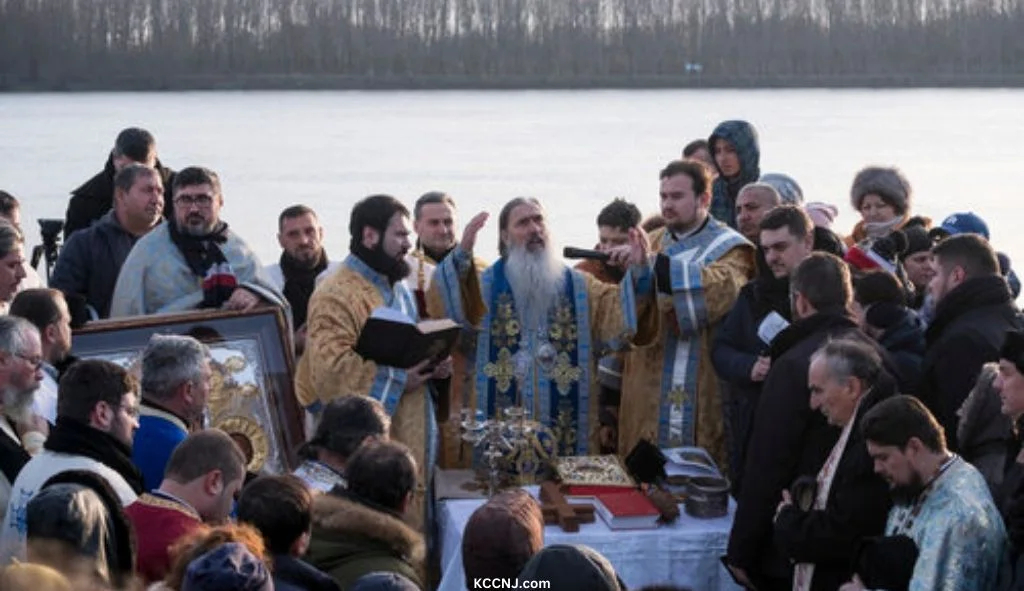
Romanian Orthodox Christians celebrate Epiphany as “Boboteaza.” The blessing of waters is a central part of the celebrations. In some regions, priests throw wooden crosses into rivers, and young men dive to retrieve them.
A unique Romanian tradition is the blessing of horses on Epiphany. In some villages, horses are decorated and brought to church to be blessed with holy water.
The Liturgical Significance of Orthodox Epiphany
Orthodox Epiphany is not just a day of cultural traditions; it holds deep liturgical significance in the Orthodox Church.
The Feast of Lights
Epiphany is sometimes called the “Feast of Lights” in Orthodox tradition. This name refers to the spiritual illumination that comes through baptism and the revelation of the Holy Trinity.
Liturgical Services
The Orthodox Church has special liturgical services for Epiphany:
- Royal Hours: Celebrated on January 18th, these are extended prayer services that include Old Testament readings, Epistles, and Gospels related to Christ’s baptism.
- Vesperal Divine Liturgy: On the eve of Epiphany, this service combines Vespers (evening prayers) with the Divine Liturgy. It includes the first Great Blessing of Waters.
- Festal Orthros and Divine Liturgy: On the morning of Epiphany, these services celebrate the feast with special hymns and readings. The second Great Blessing of Waters typically follows the Divine Liturgy.
Hymns
The hymns and readings for Epiphany focus on themes of revelation, baptism, and purification.
Hypakoe (Plagal of First Tone)
“When You enlightened all things by Your Epiphany, the briny sea of unbelief fled, and as Jordan flowed down, it turned back, exalting us to Heaven.”
Readings
From Isaiah 55:1-13
“Come, all you who are thirsty,
come to the waters;
and you who have no money,
come, buy and eat!
Come, buy wine and milk
without money and without cost.
Why spend money on what is not bread,
and your labor on what does not satisfy?
Listen, listen to me, and eat what is good,
and you will delight in the richest of fare.”
From Mark 1:9-11
In those days Jesus came from Nazareth of Galilee and was baptized by John in the Jordan. And when he came up out of the water, immediately he saw the heavens being torn open and the Spirit descending on him like a dove.
Theological Implications of Orthodox Epiphany
Orthodox Epiphany carries profound theological significance within Eastern Orthodox Christianity.
Revelation of the Trinity
The baptism of Christ is seen as the first clear revelation of the Holy Trinity in the New Testament.
Theosis and Deification
The concept of theosis, or deification, is central to Orthodox theology. Epiphany highlights this teaching by showing how Christ’s baptism sanctifies the waters and, by extension, all of creation. This act is seen as part of God’s plan to restore humanity and the entire cosmos to its intended state of communion with Him.
Baptismal Theology
Epiphany reinforces the Orthodox understanding of baptism as more than just a symbolic act. It’s seen as a real participation in Christ’s death and resurrection, a washing away of sin, and an illumination by the Holy Spirit.
Preparing for Orthodox Epiphany 2025
For Orthodox Christians, preparation for Epiphany begins well before the actual feast day. Here are some ways believers prepare:
Fasting
While not as strict as the Nativity Fast, many Orthodox Christians observe some degree of fasting on January 18th, the eve of Epiphany. This typically involves abstaining from meat and dairy products.
Spiritual Reflection
The days leading up to Epiphany are often a time for spiritual reflection. Believers are encouraged to meditate on the meaning of Christ’s baptism and its implications for their own lives.
House Cleaning and Decoration
Many families thoroughly clean their homes before Epiphany, preparing to receive the priest for the house blessing. Some also decorate their homes with greenery or special Epiphany ornaments.
Attending Services
Participation in the special liturgical services is an important part of preparation. Many Orthodox Christians attend the Royal Hours on January 18th and the Vesperal Divine Liturgy in the evening.
The Importance of Water in Orthodox Epiphany
Water plays a central role in the Epiphany celebrations, reflecting its significance in Orthodox theology and practice.
Symbolism of Water
In Orthodox tradition, water represents:
- Purification and cleansing from sin
- New life and rebirth
- The presence and action of the Holy Spirit
Holy Water
The water blessed during the Epiphany services is considered especially powerful. Orthodox Christians often keep this water in their homes throughout the year, using it for:
- Blessing their homes
- Drinking for spiritual and physical healing
- Blessing objects or places
Baptismal Remembrance
For many Orthodox Christians, Epiphany serves as a reminder of their own baptism. Some churches even perform baptisms on this day, emphasizing the connection between Christ’s baptism and the sacrament of baptism in the Church.
Orthodox Epiphany and Ecumenical Relations
While the date and some traditions differ, Epiphany provides an opportunity for dialogue and understanding between Eastern and Western Christian traditions.
Shared Roots
Both Orthodox and Western Christians recognize the importance of Epiphany, even if they emphasize different aspects of Christ’s revelation.
Ecumenical Services
In some places, Orthodox and other Christian denominations hold joint prayer services or events around Epiphany, fostering unity and mutual understanding.
Cultural Exchange
The rich traditions associated with Orthodox Epiphany often attract interest from non-Orthodox people, providing opportunities for cultural exchange and interfaith dialogue.
Frequently Asked Questions
What is the difference between Orthodox Epiphany and Western Epiphany?
Orthodox Epiphany primarily commemorates the baptism of Jesus in the Jordan River, while Western Epiphany focuses on the visit of the Magi to the infant Jesus. Orthodox Epiphany is typically celebrated on January 19th (except in some churches like the Greek Orthodox), while Western churches observe it on January 6th.
Why do Orthodox Christians jump into cold water on Epiphany?
This tradition, known as “Epiphany bathing,” symbolizes purification and renewal. It’s inspired by Christ’s baptism in the Jordan River and is believed to wash away sins and bring good health. While not a required practice, it has become popular in many Orthodox countries.
How long does the Orthodox Epiphany celebration last?
The main celebration of Orthodox Epiphany is on January 19th, but the entire season can last for several days. Some traditions extend the celebrations from January 19th to January 27th, known as the “Epiphany season” or “Afterfeast of Theophany.”
Can non-Orthodox people participate in Epiphany celebrations?
Yes, many Epiphany celebrations are open to the public, and non-Orthodox people are often welcome to observe or even participate in certain aspects, such as the blessing of waters. However, participation in sacramental aspects like receiving holy water may be restricted to Orthodox Christians.
What is the significance of the cross in Orthodox Epiphany celebrations?
The cross plays a central role in many Epiphany traditions, symbolizing Christ’s presence and blessing. In some places, a priest throws a cross into water for swimmers to retrieve, representing the sanctification of the waters by Christ’s baptism.







